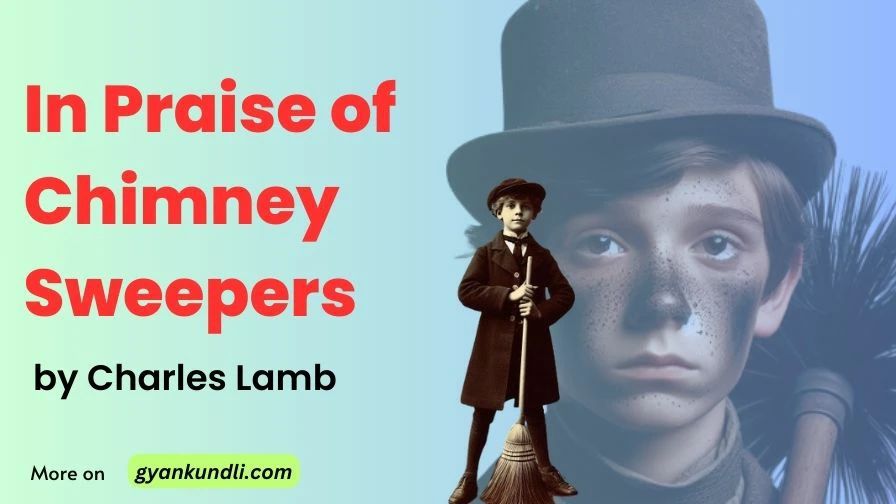In Praise of Chimney Sweepers: Introduction
Charles Lamb’s essay, “In Praise of Chimney Sweepers,” uncovers his deep compassion for those who are struggling and downtrodden. He genuinely admires chimney sweepers and their hard work.
According to Lamb, the voices of chimney sweepers remind him of the cheerful chirping of sparrows. He sees the boys in their dark clothes as resembling clergyman, and in their diligent labor, they silently preach patience to humanity. Lamb used to be surprised when the sweepers vanished into the complex chimneys, but his relief was immense when they emerged on the roof, their brushes weaving like magical flags.
Lamb encourages readers to be generous by giving a penny or two to the sweepers. He suggests offering them Sassafras tea, made by boiling the wood of sassafras, which has a strong smell. Lamb believes that giving them tea will make them work with enthusiasm, potentially preventing chimney fires.
In a personal incident, Lamb fell down while walking along a street, and a chimney sweeper laughed at him. Instead of getting angry, Lamb appreciated the boy’s innocent joy, free from malice. He even mentions he would have endured the laughter until midnight. He noticed the sweeper’s white teeth shining in contrast to his black skin and clothes.
Lamb expresses a belief that some chimney sweepers may come from noble families, kidnapped in infancy and forced into this work. He shares a story of a sweeper who slept on Duke Howard’s state bed, suggesting a connection to aristocratic backgrounds. Their civil and courteous behavior further supports this idea.
Lamb praises his friend Jem White for his sympathy towards chimney sweepers. Jem hosts an annual dinner on St. Bartholomew’s Day in Smithfield for these workers, inviting them from around the city. He serves them with dignity, conducting the feast with great care.
To sum up, Lamb’s essay highlights his attitude of love and sympathy for these suffering children, showcasing his deep concern for their well-being.
About Charles Lamb
Charles Lamb was born on February 10, 1775, in London, England, and he passed away on December 27, 1834, in Edmonton, Middlesex. He was an English essayist and critic, most famous for his collection of essays titled “Essays of Elia,” which he wrote from 1823 to 1833.
Lamb went to school at Christ’s Hospital until 1789, where he studied alongside Samuel Taylor Coleridge and Leigh Hunt. In 1792, he started working as a clerk at East India House, where he stayed until his retirement in 1825. In 1796, Lamb’s sister Mary, in a recurring fit of madness, tragically killed their mother. Despite the challenges, Lamb bravely took on the responsibility of caring for Mary.
Lamb’s first published works were poems, contributing to collections by Coleridge (1796) and Charles Lloyd (1798). He also wrote a prose romance, “A Tale of Rosamund Gray,” in 1798, and a poetic tragedy, “John Woodvil,” in 1802. His best-known poem, “The Old Familiar Faces” (1789), stands out, but his finest poetic achievement is “On an Infant Dying As Soon As It Was Born” (1828).
In 1807, Lamb and his sister co-authored “Tales from Shakespear,” a retelling of Shakespeare’s plays for children. In 1809, they published “Mrs. Leicester’s School,” a collection of stories supposedly narrated by pupils of a school in Hertfordshire. Additionally, in 1808, Charles published a children’s version of the Odyssey called “The Adventures of Ulysses.”
Lamb’s literary contributions in 1808 extended to “Specimens of English Dramatic Poets Who Lived About the Time of Shakespear,” a selection of scenes from Elizabethan dramas, influencing 19th-century English verse styles. He also wrote critical papers on Shakespeare and William Hogarth for Hunt’s Reflector. Lamb’s criticism often took the form of brief comments and reactions, showing his delicate phrasing.
His most significant achievements were his letters and essays under the pseudonym Elia for the London Magazine, founded in 1820. Lamb’s writing style was highly personal and mannered, creating the persona of Elia. His essays, filled with humor and sometimes pathos, recalled old acquaintances and scenes from his life, showcasing playfulness and fancy. Despite their whimsical tone, Lamb’s essays expressed the Romantic movement’s spirit, aligning with Coleridge and Wordsworth’s verse. The essay “On the Artificial Comedy of the Last Century” (1822) revived interest in Restoration comedy and foreshadowed the Aesthetic movement of the late 19th century.
The first series of Elia essays were published in 1823, and a second series, known as “The Last Essays of Elia,” appeared in 1833. Charles Lamb’s unique and influential literary contributions left a lasting mark on English literature.
Text of In Praise of Chimney Sweepers
I like to meet a sweep — understand me — not a grown sweeper — old chimney-sweepers are by no means attractive — but one of those tender novices, blooming through their first nigritude, the maternal washings not quite effaced from the cheek — such as come forth with the dawn, or somewhat earlier, with their little professional notes sounding like the peep peep of a young sparrow; or liker to the matin lark should I pronounce them, in their aerial ascents not seldom anticipating the sun-rise?
I have a kindly yearning towards these dim specks — poor blots — innocent blacknesses –
I reverence these young Africans of our own growth — these almost clergy imps, who sport their cloth without assumption; and from their little pulpits (the tops of chimneys), in the nipping air of a December morning, preach a lesson of patience to mankind.
When a child, what a mysterious pleasure it was to witness their operation! to see a chit no bigger than one’s-self enter, one knew not by what process, into what seemed the fauces Averni — to pursue him in imagination, as he went sounding on through so many dark stifling caverns, horrid shades — to shudder with the idea that “now, surely, he must be lost for ever! ” — to revive at hearing his feeble shout of discovered day-light — and then (O fulness of delight) running out of doors, to come just in time to see the sable phenomenon emerge in safety, the brandished weapon of his art victorious like some flag waved over a conquered citadel! I seem to remember having been told, that a bad sweep was once left in a stack with his brush, to indicate which way the wind blew. It was an awful spectacle certainly; not much unlike the old stage direction in Macbeth, where the “Apparition of a child crowned with a tree in his hand rises.”
Reader, if thou meetest one of these small gentry in thy early rambles, it is good to give him a penny. It is better to give him two-pence. If it be starving weather, and to the proper troubles of his hard occupation, a pair of kibed heels (no unusual accompaniment) be superadded, the demand on thy humanity will surely rise to a tester.
There is a composition, the ground-work of which I have understood to be the sweet wood `yclept sassafras. This wood boiled down to a kind of tea, and tempered with an infusion of milk and sugar, hath to some tastes a delicacy beyond the China luxury. I know not how thy palate may relish it; for myself, with every deference to the judicious Mr. Read, who hath time out of mind kept open a shop (the only one he avers in London) for the vending of this “wholesome and pleasant beverage, on the south side of Fleet-street, as thou approachest Bridge-street — the only Salopian house, — I have never yet adventured to dip my own particular lip in a basin of his commended ingredient — a cautious premonition to the olfactories constantly whispering to me, that my stomach must infallibly, with all due courtesy, decline it. Yet I have seen palates, otherwise not uninstructed in dietetical elegances, sup it up with avidity.
I know not by what particular conformation of the organ it happens, but I have always found that this composition is surprisingly gratifying to the palate of a young chimney-sweeper — whether the oily particles (sassafras is slightly oleaginous) do attenuate and soften the fuliginous concretions, which are sometimes found (in dissections) to adhere to the roof of the mouth in these unfledged practitioners or whether Nature, sensible that she had mingled too much of bitter wood in the lot of these raw victims, caused to grow out of the earth her sassafras for a sweet lenitive but so it is, that no possible taste or odour to the senses of a young chimney-sweeper can convey a delicate excitement comparable to this mixture. Being penniless, they will yet hang their black heads over the ascending steam, to gratify one sense if possible, seemingly no less pleased than those domestic animals — cats — when they purr over a new-found sprig of valerian. There is something more in these sympathies than philosophy can inculcate.
Now albeit Mr. Read boasteth, not without reason, that his is the only Salopion house; yet he it known to thee, reader — if thou art one who keepest what are called good hours, thou art haply ignorant of the fact — he hath a race of industrious imitators, who from stalls, and under open sky, dispense the same savoury mess to humbler customers, at that dead time of the dawn, when (as extremes meet) the rake, reeling home from his midnight cups, and the hard- handed artisan leaving his bed to resume the premature labours of the day, jostle, not unfrequently to the manifest disconcerting of the former, for the honours of the pavement. It is the time when, in summer, between the expired and the not yet relumined kitchen- fires, the kennels of our fair metropolis give forth their least satisfactory odours. The rake, who wisheth to dissipate his o’ernight vapours in more grateful coffee, curses the ungenial fume, as he passeth; but the artisan stops to taste, and blesses the fragrant breakfast.This is Saloop — the precocious herb-woman’s darling — the delight of the early gardener, who transports his smoking cabbages by break of day from Hammersmith to Covent-garden‘s famed piazzas — the delight, and, oh I fear, too often the envy, of the unpennied sweep. Him shouldest thou haply encounter, with his dim visage pendent over the grateful steam, regale him with a sumptuous basin (it will cost thee but three halfpennies) and a slice of delicate bread and butter (an added halfpenny) — so may thy culinary fires, eased of the o’er-charged secretions from thy worse-placed hospitalities, curl up a lighter volume to the welkin — so may the descending soot never taint thy costly well-ingredienced soups — nor the odious cry, quick-reaching from street to street, of the fired chimney, invite the rattling engines from ten adjacent parishes, to disturb for a casual scintillation thy peace and pocket!
I am by nature extremely susceptible of street affronts; the jeers and taunts of the populace; the low-bred triumph they display over the casual trip, or splashed stocking, of a gentleman. Yet can I endure the jocularity of a young sweep with something more than forgiveness. In the last winter but one, pacing along Cheap-side with my accustomed precipitation when I walk westward, a treacherous slide brought me upon my back in an instant. I scrambled up with pain and shame enough — yet outwardly trying to face it down, as if nothing had happened — when the roguish grin of one of these young wits encountered me.There he stood, pointing me out with his dusky finger to the mob, and to a poor woman (I suppose his mother) in particular, till the tears for the exquisiteness of the fun (so he thought it) worked themselves out at the corners of his poor red eyes, red from many a previous weeping, and soot- inflamed, yet twinkling through all with such a joy, snatched out of desolation, that Hogarth — but Hogarth has got him already (how could he miss him?) in the March to Finchley, grinning at the pye-man — there he stood, as he stands in the picture, irremovable, as if the jest was to last for ever — with such a maximum of glee, and minimum of mischief, in his mirth — for the grin of a genuine sweep hath absolutely no malice in it — that I could have been content, if the honour of a gentleman might endure it, to have remained his butt and his mockery till midnight.
I am by theory obdurate to the seductiveness of what are called a fine set of teeth. Every pair of rosy lips (the ladies must pardon me) is a casket, presumably holding such jewels; but, methinks, they should take leave to “air ” them as frugally as possible. The fine lady, or fine gentleman, who show me their teeth, show me bones. Yet must I confess, that from the mouth of a true sweep a display (even to ostentation) of those white and shining ossifications, strikes me as an agreeable anomaly in manners, and an allowable piece of foppery. It is, as when
A sable cloud
Turns forth her silver lining on the night.
It is like some remnant of gentry not quite extinct; a badge of better days; a hint of nobility — and, doubtless, under the obscuring darkness and double night of their forlorn disguisement, oftentimes lurketh good blood, and gentle conditions, derived from lost ancestry, and a lapsed pedigree. The premature apprenticements of these tender victims give but too much encouragement, I fear, to clandestine, and almost infantile abductions; the seeds of civility and true courtesy, so often discernible in these young grafts (not otherwise to be accounted for) plainly hint at some forced adoptions; many noble Rachels mourning for their children, even in our days, countenance the fact; the tales of fairy-spiriting may shadow a lamentable verity, and the recovery of the young Montagu be but a solitary instance of good fortune, out of many irreparable and hopeless defiliations.
In one of the state-beds at Arundel castle, a few years since under a ducal canopy — (that seat of the Howards is an object of curiosity to visitors, chiefly for its beds, in which the late duke was especially a connoisseur) encircled with curtains of delicatest crimson, with starry coronets inwoven — folded between a pair of sheets whiter and softer than the lap where Venus lulled Ascanius was discovered by chance, after all methods of search had failed, at noon-day, fast asleep, a lost chimney-sweeper. The little creature, having somehow confounded his passage among the intricacies of those lordly chimneys, by some unknown aperture had alighted upon this magnificent chamber; and, tired with his tedious explorations, was unable to resist the delicious invitement to repose, which he there saw exhibited; so, creeping between the sheets very quietly, laid his black head upon the pillow, and slept. like a young Howard.
Such is the account given to the visitors at the Castle. — But I cannot help seeming to perceive a confirmation of what I have just hinted at in this story. A high instinct was at work in the case, or I am mistaken. Is it probable that a poor child of that description, with whatever weariness he might be visited, would have ventured, under such a penalty, as he would be taught to expect, to uncover the sheets of a Duke’s bed, and deliberately to lay himself down between them, when the rug, or the carpet, presented an obvious couch, still far above his pretension — is this probable,I would ask, if the great power of nature, which I contend for, had not been manifested within him, prompting to the adventure? Doubtless this young nobleman (for such my mind misgives me that he must be) was allured by some memory, not amounting to full consciousness, of his condition in infancy, when be was used to be lapt by his mother, or his nurse, in just such sheets as he there found, into which he was now but creeping back as into his proper incunabula, and resting-place. — By no other theory, than by this sentiment of a pre-existent state (as I may call it), can I explain a deed so venturous, and, indeed, any other system, so indecorous, in this tender, but unseasonable sleeper.
My pleasant friend Jem White was so impressed with a belief of metamorphoses like this frequently taking place, that in some sort to reverse the wrongs of fortune in these poor changelings, he instituted an annual feast of chimney-sweepers, at which it was his pleasure to officiate as host and waiter. It was a solemn supper held in Smithfield, upon the yearly return of the fair of St. Bartholomew. Cards were issued a week before to the master-sweeps in and about the metropolis, confining the invitation to their younger fry. Now and then an elderly stripling would get in among us, and be good-naturedly winked at; but our main body were infantry.One unfortunate wight, indeed, who, relying upon his dusky suit, had intruded himself into our party, but by tokens was providentially discovered in time to be no chimney.sweeper (all is not soot which looks so), was quoited out of the presence with universal indignation, as not having on the wedding garment; but in general the greatest harmony prevailed. The place chosen was a convenient spot among the pens, at the north side of the fair, not so far distant as to be impervious to the agreeable hub-hub of that vanity; but remote enough not to be obvious to the interruption of every gaping spectator in it. The guests assembled about seven. In those little temporary parlours three tables were spread with napery, not so fine as substantial, and at every board a comely hostess presided with her pan of hissing sausages. The nostrils of the young rogues dilated at the savour.
James White, as head waiter, had charge of the first table; and myself, with our trusty companion Bigod, ordinarily ministered to the other two. There was clambering and jostling, you may he sure, who should get at the first table — for Rochester in his maddest days could not have done the humours of the scene with more spirit than my friend. After some general expression of thanks for the honour the company had done him, his inaugural ceremony was to clasp the greasy waist of old dame Ursula (the fattest of the three), that stood frying and fretting, half-blessing, half-cursing “the gentleman,” and imprint upon her chaste lips a tender salute, whereat the universal host would set up a shout that tore the concave, while hundreds of grinning teeth startled the night with their brightness.
O it was a pleasure to see the sable younkers lick in the unctuous meat, with his more unctuous sayings — how he would fit the tit bits to the puny mouths, reserving the lengthier links for the seniors — how he would intercept a morsel even in the jaws of some young desperado, declaring it “must to the pan again to be browned, for it was not fit for a gentleman’s eating” — how he would recommend this slice of white bread, or that piece of kissing-crust, to a tender juvenile, advising them all to have a care of cracking their teeth, which were their best patrimony, how genteelly he would deal about the small ale, as if it were wine, naming the brewer, and protesting, if it were not good, he should lose their custom; with a special recommendation to wipe the lip before drinking. Then we had our toasts — ” The King,” — the “Cloth,” — which, whether they understood or not, was equally diverting and flattering; — and for a crowning sentiment, which never failed, “May the Brush supersede the Laurel!” All these, and fifty other fancies, which were rather felt than comprehended by his guests, would he utter, standing upon tables, and prefacing every sentiment with a “Gentlemen, give me leave to propose so and so,” which was a prodigious comfort to those young orphans; every now and then stuffing into his mouth (for it did not do to be squeamish on these occasions) indiscriminate pieces of those reeking sausages, which pleased them mightily, and was the savouriest part, you may believe, of the entertainment.
Golden lads and lasses must,
As chimney-sweepers, come to dust –
James White is extinct, and with him these suppers have long ceased. He carried away with him half the fun of the world when he died — of my world at least. His old clients look for him among the pens; and, missing him, reproach the altered feast of St. Bartholomew, and the glory of Smithfield departed for ever.
Detailed Summary of In Praise of Chimney Sweepers
Charles Lamb‘s essay, “In Praise of Chimney Sweepers,” celebrates the innocence and charm of young chimney sweepers, highlighting their unique qualities and the challenges they face.
Lamb expresses a fondness for meeting young chimney sweepers, particularly those who are new to their profession and still retain a certain tenderness. He compares their voices to the chirping of sparrows or the melodic notes of a lark, emphasizing their youthful and almost musical quality.
The essay reflects Lamb’s admiration for these young chimney sweepers, referring to them as “clergy imps” who, despite their dirty profession, preach a lesson of patience to humanity from the tops of chimneys. Lamb recalls the mysterious pleasure he felt as a child witnessing the sweepers’ operations and the excitement of their emergence from the chimneys, victorious with their brushes.
Lamb encourages readers to be compassionate toward these young sweepers, suggesting that giving them a penny or two is a kind gesture, especially during challenging weather conditions. He also mentions a unique remedy for their hardships, recommending Sassafras tea to be offered to the sweepers. Lamb believes this tea, made from boiling sassafras wood, can enhance their enthusiasm for their work and prevent chimney fires.
The essay humorously recounts an incident where Lamb fell on the street, and a chimney sweeper laughed at him. Rather than getting upset, Lamb appreciated the boy’s innocent joy and even expressed a willingness to endure the laughter until midnight. He noted the contrast between the sweeper’s white teeth and his black skin and clothes.
Lamb speculates on the origin of some chimney sweepers, suggesting that they might be from noble families forced into this profession through kidnapping. He tells a story of a sweeper sleeping in a duke’s bed, implying a connection to aristocratic backgrounds.
The essay concludes with Lamb praising his friend Jem White, who hosted an annual feast for chimney sweepers in Smithfield during the fair of St. Bartholomew. This festive event, filled with sausages and good-humored antics, aimed to bring joy to these young workers. Lamb expresses nostalgia for these gatherings, acknowledging the loss of fun in the world with the passing of his friend and the discontinuation of the chimney sweepers‘ suppers.
Quiz : In Praise of Chimney Sweepers Quiz : 15 MCQs
Analysis of In Praise of Chimney Sweepers
Charles Lamb really likes young chimney sweepers. He thinks they look charming, especially the new ones with a bit of dirt still on their faces. He compares their sounds to young birds or larks when they go up chimneys.
He feels sorry for them but respects them a lot. Even though they look dirty, he sees them almost like little priests teaching people to be patient from the tops of chimneys.
When Lamb was a kid, he found it fascinating to watch chimney sweepers work. He loved the suspense of them disappearing into the chimneys and the relief when they came out, like a flag waving over a conquered castle.
He thinks we should be kind to chimney sweepers, giving them a penny or two. Lamb suggests giving them Sassafras tea, which he believes makes them work better and prevents chimney fires.
Lamb talks about Sassafras tea and how it might taste good to young chimney sweepers. He wonders if the slightly oily nature of the tea makes it enjoyable for them.
Lamb shares a story of falling down on the street, and instead of getting upset, he appreciates a young chimney sweeper who laughs at him. He likes the boy’s joy without any meanness.
Lamb talks about the oddity of chimney sweepers showing their white teeth. He thinks it’s nice and even suggests there might be something noble about them.
Lamb imagines that some chimney sweepers might have noble backgrounds, kidnapped when they were babies. He shares a story of a sweeper found asleep in a fancy bed, hinting at the comfort he felt there.
Lamb tells about his friend Jem White, who started an annual feast for chimney sweepers. It was a happy event with sausages, toasts, and fun gestures.
In the end, Lamb reflects on the joy his friend brought and feels sad that his friend is no longer around. He misses the good times and talks about how things have changed.
Also read : Of Studies by Francis Bacon: Introduction, Summary & Analysis
Discover more from Gyankundli
Subscribe to get the latest posts sent to your email.














1 thought on “In Praise of Chimney Sweepers by Charles Lamb : Text, Summary & Analysis”